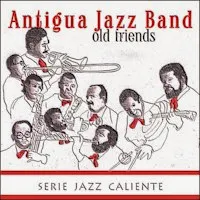Time: 60:43
Size: 139.0 MB
Styles: Mainstream jazz
Year: 2013
Art: Front
[11:07] 1. Liberty Avenue Stroll
[ 7:24] 2. All Blues
[ 6:27] 3. Guantanamera
[11:36] 4. Breakthrough
[ 7:35] 5. Nuages
[ 7:07] 6. Oh Daddy Blues
[ 9:23] 7. Honky Tonk
Mack Avenue SuperBand’s Live From The Detroit Jazz Festival – 2013 documents a concert at the Motor City’s capacious Hart Plaza by an ensemble of leaders culled from Mack Avenue Records’ extraordinary artist roster. It’s the second configuration of the group, which debuted at the 2012 Detroit Jazz Festival, mixing veteran stars with mid-career leaders and up-and-comers. The resulting album, Live From The Detroit Jazz Festival – 2012, received critical kudos for the fiery chemistry and soloistic derring-do contained therein.
For the follow-up, Al Pryor, Mack Avenue’s Executive Vice President for A&R, assembled a slightly pared-down unit. Back for round two are vibraphonist Gary Burton, trumpeter Sean Jones, guitarist Evan Perri, and the rhythm section of pianist Aaron Diehl, bassist (and music director) Rodney Whitaker and drummer Carl Allen. Joining the mix are veteran soul/jazz saxophone giant Kirk Whalum and the sensational vibraphonist-marimbist, Warren Wolf. The results are no less scintillating—a program as cohesive and precise as a studio recording, but infused with energetic vibrations emanating from the several thousand hip, enthusiastic fans who attended the free concert.
Whitaker attributes the bandstand discipline and simpatico in part to his determination to follow collective, inclusive principles in organizing the program. “I solicited everyone’s input,” he says. “With artists at this level, you don’t need to dictate every moment. Sometimes it’s more important to listen and facilitate, and not always try to be the boss. When you have a conversation with everyone about what music we’re playing and the direction we want to go, everybody buys in, and they make it sound like a band. We put together a set list two months before the concert took place.”
Whitaker discerns several common denominators that promoted camaraderie. One is the role of gospel music in the musical development of Whalum, Jones, Wolf, Diehl, Allen and himself during formative years. “Everyone—not just those who grew up in church—tries to tell a story in the way they play, in the way they try to touch an audience and say something to them,” he says. “They put together their solos to get across a message that music is not just about notes, but has some greater meaning, whatever you may translate that to mean.”
(Carl Allen – drums 1, 2, 4, 7; Gary Burton – vibes 2, 7; Aaron Diehl – piano 1, 4-7; Kevin Eubanks – guitar 2, 7; Tia Fuller – alto sax 1, 4, 7; Sean Jones – trumpet 1, 4, 7; Cécile McLorin Salvant – vocals 6; Evan Perri – guitar 5, 7; Diego Rivera – tenor sax 7; Alfredo Rodríguez – piano 3; Rodney Whitaker – bass 1, 2, 4-7)
For the follow-up, Al Pryor, Mack Avenue’s Executive Vice President for A&R, assembled a slightly pared-down unit. Back for round two are vibraphonist Gary Burton, trumpeter Sean Jones, guitarist Evan Perri, and the rhythm section of pianist Aaron Diehl, bassist (and music director) Rodney Whitaker and drummer Carl Allen. Joining the mix are veteran soul/jazz saxophone giant Kirk Whalum and the sensational vibraphonist-marimbist, Warren Wolf. The results are no less scintillating—a program as cohesive and precise as a studio recording, but infused with energetic vibrations emanating from the several thousand hip, enthusiastic fans who attended the free concert.
Whitaker attributes the bandstand discipline and simpatico in part to his determination to follow collective, inclusive principles in organizing the program. “I solicited everyone’s input,” he says. “With artists at this level, you don’t need to dictate every moment. Sometimes it’s more important to listen and facilitate, and not always try to be the boss. When you have a conversation with everyone about what music we’re playing and the direction we want to go, everybody buys in, and they make it sound like a band. We put together a set list two months before the concert took place.”
Whitaker discerns several common denominators that promoted camaraderie. One is the role of gospel music in the musical development of Whalum, Jones, Wolf, Diehl, Allen and himself during formative years. “Everyone—not just those who grew up in church—tries to tell a story in the way they play, in the way they try to touch an audience and say something to them,” he says. “They put together their solos to get across a message that music is not just about notes, but has some greater meaning, whatever you may translate that to mean.”
(Carl Allen – drums 1, 2, 4, 7; Gary Burton – vibes 2, 7; Aaron Diehl – piano 1, 4-7; Kevin Eubanks – guitar 2, 7; Tia Fuller – alto sax 1, 4, 7; Sean Jones – trumpet 1, 4, 7; Cécile McLorin Salvant – vocals 6; Evan Perri – guitar 5, 7; Diego Rivera – tenor sax 7; Alfredo Rodríguez – piano 3; Rodney Whitaker – bass 1, 2, 4-7)
Live From The Detroit Jazz Festival




















